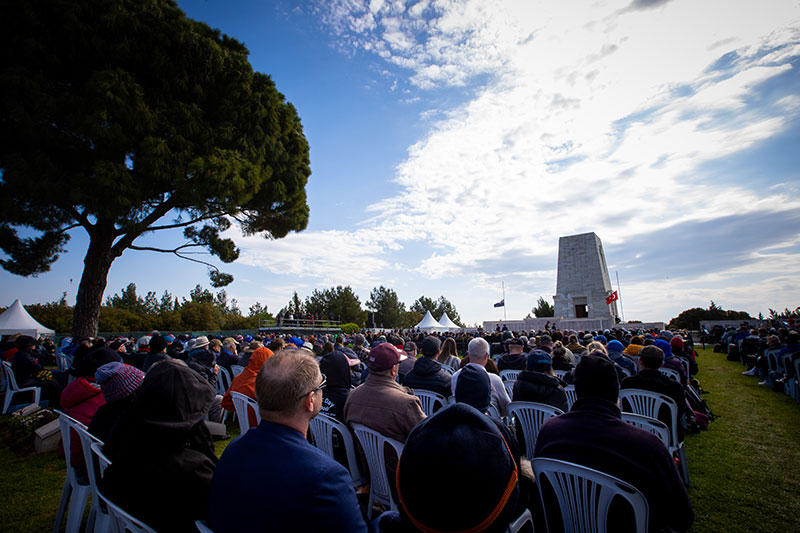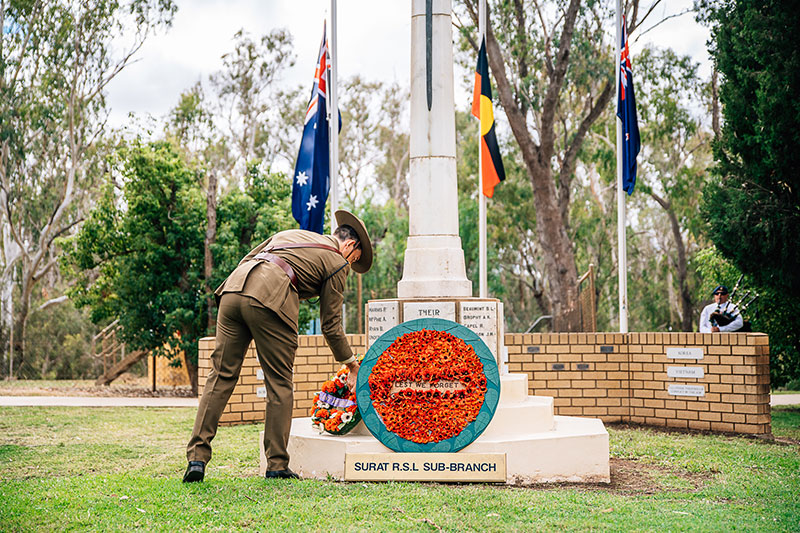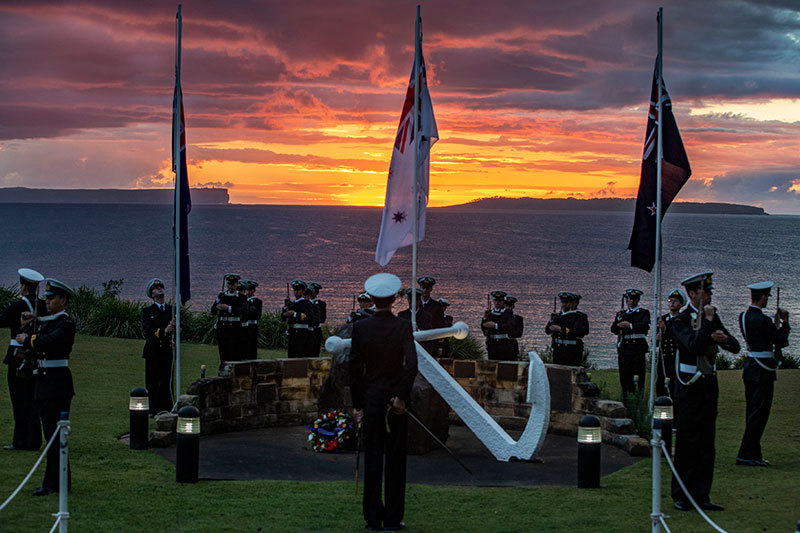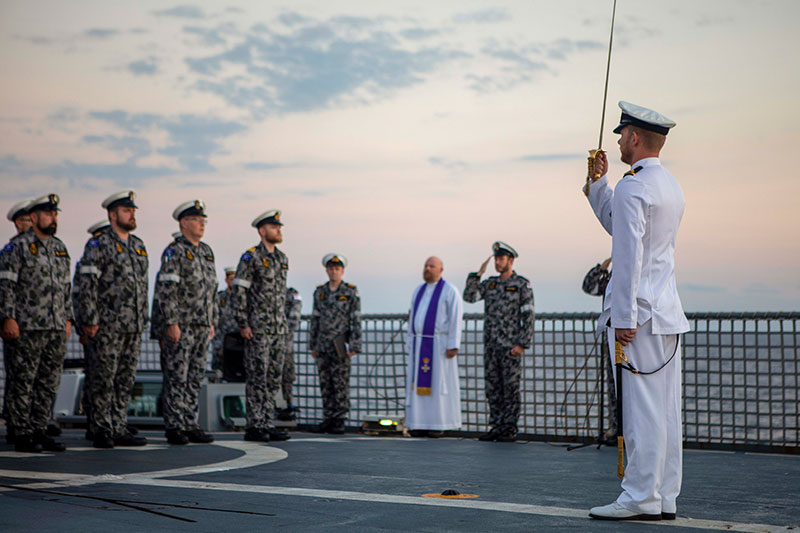25 March 2025
A first-timer’s guide to ANZAC Day
Why is ANZAC Day important to Australians?
ANZAC Day (25 April) is Australia’s national day of commemoration. It marks the anniversary of the landing at Gallipoli, Türkiye in 1915 – the first major military action involving Australian and New Zealand forces during World War I.
Approximately 20,000 Australian and New Zealand Army Corps (ANZAC) soldiers landed on the beach at dawn and were met with intense resistance from the Turks. Thousands of soldiers sustained casualties, and many made the ultimate sacrifice that day.
ANZAC Day at Lone Pine Cemetery in Gallipoli (image credit Defence Australia)
One year later, Australian, New Zealander and English troops commemorated the events of 25 April 1915 from their post in Egypt. Later in 1916, ANZAC Day was officially named by Acting Australian Prime Minister George Pearce.
Today, Australians and New Zealanders consider ANZAC Day a day of commemoration, solemnity and pride. It is a day to recognise all who have served our country – whether in wars, conflicts, peacekeeping or other operations – and their contribution towards our way of life. Pausing to show gratitude for the service and sacrifice of those who have served in our Defence Forces is just as important now as it was on the first ANZAC Day in 1916.
What happens on ANZAC Day?
ANZAC Day is commemorated and observed as a public holiday Australia-wide each year. (Unlike other Australian public holidays, ANZAC Day is always observed on 25 April, even if the date falls on a weekend.)
Schools and most businesses close, and thousands of free events (detailed below) are held across the country to commemorate current and former service personnel. All members of the community are welcome to attend.
ANZAC Day in Surat, Queensland
Midnight and Dawn Services
Some cities may begin ANZAC Day with a midnight service or vigil as 25 April ticks over. In most areas, however, ANZAC Day generally starts with a Dawn Service. These services usually run from 30 to 60 minutes at outdoor locations such as war memorial sites, cenotaphs, parks, beaches and nature reserves.
Services begin before sunrise and follow a formal order of proceedings which usually include a catafalque party, speeches, prayers, readings, and wreath laying. As an attendee, you will be invited to observe a minute’s silence and sing the national anthem at the conclusion of the service.
An ANZAC Day Dawn Service overlooking Jervis Bay in New South Wales
Gunfire breakfasts
Following the Dawn Service, some cities and towns will host a gunfire breakfast, serving (traditionally) rum-laced coffee and tea and hot food like bacon and eggs. The rum harks back to the measure of liquid courage that was served up at the beginning of the day to help soldiers face the coming battle.
While many of these breakfasts are hosted exclusively for veterans, others are open to all community members. Such events offer a nice opportunity to meet and chat with local veterans.
Day services and marches
Many communities also hold a mid-morning service (around 9-11am). This usually includes a march of veterans, current serving Defence Force members and ex-service organisations who’ve contributed to keeping our nation safe and secure.
Marches are usually more casual than services, so feel free to show your support by waving to, and cheering for, those who march in the event.
Afternoon and evening events
To cap off the day, some RSL Sub Branches may host afternoon and evening events where community members can meet, try their hand at a game of two-up, and experience the ANZAC spirit of camaraderie.
Tips on attending an ANZAC Day event.
Here’s a few extra tips to help you get ready for ANZAC Day.
Planning ahead
- Prior to 25 April, find your nearest service or explore some of Australia’s most scenic services.
- We recommend double-checking the time that your chosen ANZAC Day event begins. Plan your day ahead if your area has limited public transport options. Parking may also be limited, so aim to arrive well before the service begins.
What to wear and bring
- While there’s no formal ANZAC Day dress code, smart or business attire is considered appropriate.
- If you plan to attend a Dawn Service, we recommend dressing comfortably in warm layers and checking your local weather forecast for rain before sunrise.
- If you or a late relative were awarded service medals, you’re encouraged to wear them (or replicas) at ANZAC Day commemorations – provided you follow the relevant protocols outlined by the government and RSL Australia.
- Depending on how many people march in your local ANZAC Day parade, these events can run for up to a few hours. Be sun smart and bring water to keep hydrated.
During a service
At formal services, switch off your phone or set it to silent mode.
Use your time as an opportunity to listen and quietly reflect. Join the congregation in observing one minute’s silence if this is in the proceedings.
Members of the Royal Australian Navy commemorating ANZAC Day onboard HMAS Ballarat
How else can I take part in ANZAC Day?
There are lots of other easy ways to observe ANZAC Day in Australia. Here are some ideas:
- If you can’t attend an ANZAC Day service in person, you can watch the official broadcast through the ABC’s radio, streaming and television services.
- Join in other ANZAC Day traditions like baking ANZAC biscuits or exploring your family’s military history.
- Consider helping to support veterans and their families by donating to the ANZAC Appeal.
- If you post to social media, use #AnzacSpirit to share your day with us.
This ANZAC Day
ANZAC Day (25 April) is a time to recognise all who have served our nation, and their invaluable legacy.
Wherever you’ll be on ANZAC Day, please join the community in attending a commemorative service.
There’s no greater way to honour those who have served.




